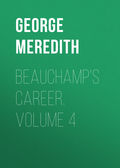
George Meredith
Vittoria. Complete
“Some,” rejoined Carlo, “say that Beppo has had the virtue to make you his study.”
Agostino threw himself on his back and closed his eyes. “That, then, is more than you have done, signor Tuquoque. Look on the Bernina yonder, and fancy you behold a rout of phantom Goths; a sleepy rout, new risen, with the blood of old battles on their shroud-shirts, and a North-east wind blowing them upon our fat land. Or take a turn at the other side toward Orta, and look out for another invasion, by no means so picturesque, but preferable. Tourists! Do you hear them?”
Carlo Ammiani had descried the advanced troop of a procession of gravely-heated climbers ladies upon donkeys, and pedestrian guards stalking beside them, with courier, and lacqueys, and baskets of provisions, all bearing the stamp of pilgrims from the great Western Island.
CHAPTER VI
A mountain ascended by these children of the forcible Isle, is a mountain to be captured, and colonized, and absolutely occupied for a term; so that Vittoria soon found herself and her small body of adherents observed, and even exclaimed against, as a sort of intruding aborigines, whose presence entirely dispelled the sense of romantic dominion which a mighty eminence should give, and which Britons expect when they have expended a portion of their energies. The exclamations were not complimentary; nevertheless, Vittoria listened with pleased ears, as one listens by a brookside near an old home, hearing a music of memory rather than common words. They talked of heat, of appetite, of chill, of thirst, of the splendour of the prospect, of the anticipations of good hotel accommodation below, of the sadness superinduced by the reflection that in these days people were found everywhere, and poetry was thwarted; again of heat, again of thirst, of beauty, and of chill. There was the enunciation of matronly advice; there was the outcry of girlish insubordination; there were sighings for English ale, and namings of the visible ranges of peaks, and indicatings of geographical fingers to show where Switzerland and Piedmont met, and Austria held her grasp on Lombardy; and “to this point we go to-night; yonder to-morrow; farther the next day,” was uttered, soberly or with excitement, as befitted the age of the speaker.
Among these tourists there was one very fair English lady, with long auburn curls of the traditionally English pattern, and the science of Paris displayed in her bonnet and dress; which, if not as graceful as severe admirers of the antique in statuary or of the mediaeval in drapery demand, pleads prettily to be thought so, and commonly succeeds in its object, when assisted by an artistic feminine manner. Vittoria heard her answer to the name of Mrs. Sedley. She had once known her as a Miss Adela Pole. Amidst the cluster of assiduous gentlemen surrounding this lady it was difficult for Vittoria’s stolen glances to discern her husband; and the moment she did discern him she became as indifferent to him as was his young wife, by every manifestation of her sentiments. Mrs. Sedley informed her lord that it was not expected of him to care, or to pretend to care, for such scenes as the Motterone exhibited; and having dismissed him to the shade of an umbrella near the provision baskets, she took her station within a few steps of Vittoria, and allowed her attendant gentlemen to talk while she remained plunged in a meditative rapture at the prospect. The talk indicated a settled scheme for certain members of the party to reach Milan from the Como road. Mrs. Sedley was asked if she expected her brother to join her here or in Milan.
“Here, if a man’s promises mean anything,” she replied languidly.
She was told that some one waved a handkerchief to them from below.
“Is he alone?” she said; and directing an operaglass upon the slope of the mountain, pursued, as in a dreamy disregard of circumstances: “That is Captain Gambier. My brother Wilfrid has not kept his appointment. Perhaps he could not get leave from the General; perhaps he is married; he is engaged to an Austrian Countess, I have heard. Captain Gambier did me the favour to go round to a place called Stresa to meet him. He has undertaken the journey for nothing. It is the way with all journeys though this” (the lady had softly reverted to her rapture) “this is too exquisite! Nature at least does not deceive.”
Vittoria listened to a bubbling of meaningless chatter, until Captain Gambier had joined Mrs. Sedley; and at him, for she had known him likewise, she could not forbear looking up. He was speaking to Mrs. Sedley, but caught the look, and bent his head for a clearer view of the features under the broad straw hat. Mrs. Sedley commanded him imperiously to say on.
“Have you no letter from Wilfrid? Has the mountain tired you? Has Wilfrid failed to send his sister one word? Surely Mr. Pericles will have made known our exact route to him? And his uncle, General Pierson, could—I am certain he did—exert his influence to procure him leave for a single week to meet the dearest member of his family.”
Captain Gambier gathered his wits to give serviceable response to the kindled lady, and letting his eyes fall from time to time on the broad straw hat, made answer—“Lieutenant Pierson, or, in other words, Wilfrid Pole—”
The lady stamped her foot and flushed.
“You know, Augustus, I detest that name.”
“Pardon me a thousandfold. I had forgotten.”
“What has happened to you?”
Captain Gambier accused the heat.
“I found a letter from Wilfrid at the hotel. He is apparently kept on constant service between Milan, and Verona, and Venice. His quarters are at Verona. He informs me that he is to be married in the Spring; that is, if all continues quiet; married in the Spring. He seems to fancy that there may be disturbances; not of a serious kind, of course. He will meet you in Milan. He has never been permitted to remain at Milan longer than a couple of days at a stretch. Pericles has told him that she is in Florence. Pericles has told me that Miss Belloni has removed to Florence.”
“Say it a third time,” the lady indulgently remarked.
“I do not believe that she has gone.”
“I dare say not.”
“She has changed her name, you know.”
“Oh, dear, yes; she has done something fantastic, naturally! For my part, I should have thought her own good enough.”
“Emilia Alessandra Belloni is good enough, certainly,” said Captain Gambier.
The shading straw rim had shaken once during the colloquy. It was now a fixed defence.
“What is her new name?” Mrs. Sedley inquired.
“That I cannot tell. Wilfrid merely mentions that he has not seen her.”
“I,” said Mrs. Sedley, “when I reach Milan, shall not trust to Mr. Pericles, but shall write to the Conservatorio; for if she is going to be a great cantatrice, really, it will be agreeable to renew acquaintance with her. Nor will it do any mischief to Wilfrid, now that he is engaged. Are you very deeply attached to straw hats? They are sweet in a landscape.”
Mrs. Sedley threw him a challenge from her blue eyes; but his reply to it was that of an unskilled youth, who reads a lady by the letters of her speech:—“One minute. I will be with you instantly. I want to have a look down on the lake. I suppose this is one of the most splendid views in Italy. Half a minute!”
Captain Gambier smiled brilliantly; and the lady, perceiving that polished shield, checked the shot of indignation on her astonished features, and laid it by. But the astonishment lingered there, like the lines of a slackened bow. She beheld her ideal of an English gentleman place himself before these recumbent foreign people, and turn to talk across them, with a pertinacious pursuit of the face under the bent straw hat. Nor was it singular to her that one of them at last should rise and protest against the continuation of the impertinence.
Carlo Ammiani, in fact, had opened matters with a scrupulously-courteous bow.
“Monsieur is perhaps unaware that he obscures the outlook?”
“Totally, monsieur,” said Captain Gambier, and stood fast.
“Will monsieur do me the favour to take three steps either to the right or to the left?”
“Pardon, monsieur, but the request is put almost in the form of an order.”
“Simply if it should prove inefficacious in the form of a request.”
“What, may I ask, monsieur, is your immediate object?”
“To entreat you to behave with civility.”
“I am at a loss, monsieur, to perceive any offence.”
“Permit me to say, it is lamentable you do not know when you insult a lady.”
“I have insulted a lady?” Captain Gambier looked profoundly incredulous. “Oh! then you will not take exception to my assuming the privilege to apologize to her in person?”
Ammiani arrested him as he was about to pass.
“Stay, monsieur; you determine to be impudent, I perceive; you shall not be obtrusive.”
Vittoria had tremblingly taken old Agostino’s hand, and had risen to her feet. Still keeping her face hidden, she walked down the slope, followed at an interval by her servant, and curiously watched by the English officer, who said to himself, “Well, I suppose I was mistaken,” and consequently discovered that he was in a hobble.
A short duologue in their best stilted French ensued between him and Ammiani. It was pitched too high in a foreign tongue for Captain Gambier to descend from it, as he would fain have done, to ask the lady’s name. They exchanged cards and formal salutes, and parted.
The dignified altercation had been witnessed by the main body of the tourists. Captain Gambier told them that he had merely interchanged amicable commonplaces with the Frenchman,—“or Italian,” he added carelessly, reading the card in his hand. “I thought she might be somebody whom we knew,” he said to Mrs. Sedley.
“Not the shadow of a likeness to her,” the lady returned.
She had another opinion when later a scrap of paper bearing one pencilled line on it was handed round. A damsel of the party had picked it up near the spot where, as she remarked, “the foreigners had been sitting.” It said:—
“Let none who look for safety go to Milan.”
CHAPTER VII
A week following the day of meetings on the Motterone, Luigi the spy was in Milan, making his way across the Piazza de’ Mercanti. He entered a narrow court, one of those which were anciently built upon the Oriental principle of giving shade at the small cost of excluding common air. It was dusky noon there through the hours of light, and thrice night when darkness fell. The atmosphere, during the sun’s short passage overhead, hung with a glittering heaviness, like the twinkling iron-dust in a subterranean smithy. On the lower window of one of the houses there was a board, telling men that Barto Rizzo made and mended shoes, and requesting people who wished to see him to make much noise at the door, for he was hard of hearing. It speedily became known in the court that a visitor desired to see Barto Rizzo. The noise produced by Luigi was like that of a fanatical beater of the tomtom; he knocked and banged and danced against the door, crying out for his passing amusement an adaptation of a popular ballad:—“Oh, Barto, Barto! my boot is sadly worn: The toe is seen that should be veiled from sight. The toe that should be veiled like an Eastern maid: like a sultan’s daughter: Shocking! shocking! One of a company of ten that were living a secluded life in chaste privacy! Oh, Barto, Barto! must I charge it to thy despicable leather or to my incessant pilgrimages? One fair toe! I fear presently the corruption of the remaining nine: Then, alas! what do I go on? How shall I come to a perfumed end, who walk on ten indecent toes? Well may the delicate gentlemen sneer at me and scorn me: As for the angelic Lady who deigns to look so low, I may say of her that her graciousness clothes what she looks at: To her the foot, the leg, the back: To her the very soul is bared: But she is a rarity upon earth. Oh, Barto, Barto, she is rarest in Milan! I might run a day’s length and not find her. If, O Barto, as my boot hints to me, I am about to be stripped of my last covering, I must hurry to the inconvenient little chamber of my mother, who cannot refuse to acknowledge me as of this pattern: Barto, O shoemaker! thou son of artifice and right-hand-man of necessity, preserve me in the fashion of the time: Cobble me neatly: A dozen wax threads and I am remade:—Excellent! I thank you! Now I can plant my foot bravely: Oh, Barto, my shoemaker! between ourselves, it is unpleasant in these refined days to be likened at all to that preposterous Adam!”
The omission of the apostrophes to Barto left it one of the ironical, veiled Republican, semi-socialistic ballads of the time, which were sung about the streets for the sharpness and pith of the couplets, and not from a perception of the double edge down the length of them.
As Luigi was coming to the terminating line, the door opened. A very handsome sullen young woman, of the dark, thick-browed Lombard type, asked what was wanted; at the same time the deep voice of a man; conjecturally rising from a lower floor, called, and a lock was rattled. The woman told Luigi to enter. He sent a glance behind him; he had evidently been drained of his sprightliness in a second; he moved in with the slackness of limb of a gibbeted figure. The door shut; the woman led him downstairs. He could not have danced or sung a song now for great pay. The smell of mouldiness became so depressing to him that the smell of leather struck his nostrils refreshingly. He thought: “Oh, Virgin! it’s dark enough to make one believe in every single thing they tell us about the saints.” Up in the light of day Luigi had a turn for careless thinking on these holy subjects.
Barto Rizzo stood before him in a square of cellarage that was furnished with implements of his craft, too dark for a clear discernment of features.
“So, here you are!” was the greeting Luigi received.
It was a tremendous voice, that seemed to issue from a vast cavity. “Lead the gentleman to my sitting-room,” said Barto. Luigi felt the wind of a handkerchief, and guessed that his eyes were about to be bandaged by the woman behind him. He petitioned to be spared it, on the plea, firstly, that it expressed want of confidence; secondly, that it took him in the stomach. The handkerchief was tight across his eyes while he was speaking. His hand was touched by the woman, and he commenced timidly an ascent of stairs. It continued so that he would have sworn he was a shorter time going up the Motterone; then down, and along a passage; lower down, deep into corpse-climate; up again, up another enormous mountain; and once more down, as among rats and beetles, and down, as among faceless horrors, and down, where all things seemed prostrate and with a taste of brass. It was the poor fellow’s nervous imagination, preternaturally excited. When the handkerchief was caught away, his jaw was shuddering, his eyes were sickly; he looked as if impaled on the prongs of fright. It required just half a minute to reanimate this mercurial creature, when he found himself under the light of two lamps, and Barto Rizzo fronting him, in a place so like the square of cellarage which he had been led to with unbandaged eyes, that it relieved his dread by touching his humour. He cried, “Have I made the journey of the Signor Capofinale, who visited the other end of the world by standing on his head?”
Barto Rizzo rolled out a burly laugh.
“Sit,” he said. “You’re a poor sweating body, and must needs have a dry tongue. Will you drink?”
“Dry!” quoth Luigi. “Holy San Carlo is a mash in a wine-press compared with me.”
Barto Rizzo handed him a liquor, which he drank, and after gave thanks to Providence. Barto raised his hand.
“We’re too low down here for that kind of machinery,” he said. “They say that Providence is on the side of the Austrians. Now then, what have you to communicate to me? This time I let you come to my house trust at all, trust entirely. I think that’s the proverb. You are admitted: speak like a guest.”
Luigi’s preference happened to be for categorical interrogations. Never having an idea of spontaneously telling the whole truth, the sense that he was undertaking a narrative gave him such emotions as a bad swimmer upon deep seas may have; while, on the other hand, his being subjected to a series of questions seemed at least to leave him with one leg on shore, for then he could lie discreetly, and according to the finger-posts, and only when necessary, and he could recover himself if he made a false step. His ingenious mind reasoned these images out to his own satisfaction. He requested, therefore, that his host would let him hear what he desired to know.
Barto Rizzo’s forefinger was pressed from an angle into one temple. His head inclined to meet it: so that it was like the support to a broad blunt pillar. The cropped head was flat as an owl’s; the chest of immense breadth; the bulgy knees and big hands were those of a dwarf athlete. Strong colour, lying full on him from the neck to the forehead, made the big veins purple and the eyes fierier than the movements of his mind would have indicated. He was simply studying the character of his man. Luigi feared him; he was troubled chiefly because he was unaware of what Barto Rizzo wanted to know, and could not consequently tell what to bring to the market. The simplicity of the questions put to him was bewildering: he fell into the trap. Barto’s eyes began to get terribly oblique. Jingling money in his pocket, he said:—“You saw Colonel Corte on the Motterone: you saw the Signor Agostino Balderini: good men, both! Also young Count Ammiani: I served his father, the General, and jogged the lad on my knee. You saw the Signorina Vittoria. The English people came, and you heard them talk, but did not understand. You came home and told all this to the Signor Antonio, your employer number one. You have told the same to me, your employer number two. There’s your pay.”
Barto summed up thus the information he had received, and handed Luigi six gold pieces. The latter, springing with boyish thankfulness and pride at the easy earning of them, threw in a few additional facts, as, that he had been taken for a spy by the conspirators, and had heard one of the Englishmen mention the Signorina Vittoria’s English name. Barto Rizzo lifted his eyebrows queerly. “We’ll go through another interrogatory in an hour,” he said; “stop here till I return.”
Luigi was always too full of his own cunning to suspect the same in another, until he was left alone to reflect on a scene; when it became overwhelmingly transparent. “But, what could I say more than I did say?” he asked himself, as he stared at the one lamp Barto had left. Finding the door unfastened, he took the lamp and lighted himself out, and along a cavernous passage ending in a blank wall, against which his heart knocked and fell, for his sensation was immediately the terror of imprisonment and helplessness. Mad with alarm, he tried every spot for an aperture. Then he sat down on his haunches; he remembered hearing word of Barto Rizzo’s rack:—certain methods peculiar to Barto Rizzo, by which he screwed matters out of his agents, and terrified them into fidelity. His personal dealings with Barto were of recent date; but Luigi knew him by repute: he knew that the shoemaking business was a mask. Barto had been a soldier, a schoolmaster: twice an exile; a conspirator since the day when the Austrians had the two fine Apples of Pomona, Lombardy and Venice, given them as fruits of peace. Luigi remembered how he had snapped his fingers at the name of Barto Rizzo. There was no despising him now. He could only arrive at a peaceful contemplation of Barto Rizzo’s character by determining to tell all, and (since that seemed little) more than he knew. He got back to the leather-smelling chamber, which was either the same or purposely rendered exactly similar to the one he had first been led to.
At the end of a leaden hour Barto Rizzo returned.
“Now, to recommence,” he said. “Drink before you speak, if your tongue is dry.”
Luigi thrust aside the mention of liquor. It seemed to him that by doing so he propitiated that ill-conceived divinity called Virtue, who lived in the open air, and desired men to drink water. Barto Rizzo evidently understood the kind of man he was schooling to his service.
“Did that Austrian officer, who is an Englishman, acquainted with the Signor Antonio-Pericles, meet the lady, his sister, on the Motterone?”
Luigi answered promptly, “Yes.”
“Did the Signorina Vittoria speak to the lady?”
“No.”
“Not a word?”
“No.”
“Not one communication to her?”
“No: she sat under her straw hat.”
“She concealed her face?”
“She sat like a naughty angry girl.”
“Did she speak to the officer?”
“Not she!”
“Did she see him?”
“Of course she did! As if a woman’s eyes couldn’t see through straw-plait!”
Barto paused, calculatingly, eye on victim.
“The Signorina Vittoria,” he resumed, “has engaged to sing on the night of the Fifteenth; has she?”
A twitching of Luigi’s muscles showed that he apprehended a necessary straining of his invention on another tack.
“On the night of the Fifteenth, Signor Barto Rizzo? That’s the night of her first appearance. Oh, yes!”
“To sing a particular song?”
“Lots of them! ay-aie!”
Barto took him by the shoulder and pressed him into his seat till he howled, saying, “Now, there’s a slate and a pencil. Expect me at the end of two hours, this time. Next time it will be four: then eight, then sixteen. Find out how many hours that will be at the sixteenth examination.”
Luigi flew at the torturer and stuck at the length of his straightened arm, where he wriggled, refusing to listen to the explanation of Barto’s system; which was that, in cases where every fresh examination taught him more, they were continued, after regularly-lengthening intervals, that might extend from the sowing of seed to the ripening of grain. “When all’s delivered,” said Barto, “then we begin to correct discrepancies. I expect,” he added, “you and I will have done before a week’s out.”
“A week!” Luigi shouted. “Here’s my stomach already leaping like a fish at the smell of this hole. You brute bear! it’s a smell of bones. It turns my inside with a spoon. May the devil seize you when you’re sleeping! You shan’t go: I’ll tell you everything—everything. I can’t tell you anything more than I have told you. She gave me a cigarette—there! Now you know:—gave me a cigarette; a cigarette. I smoked it—there! Your faithful servant!”
“She gave you a cigarette, and you smoked it; ha!” said Barto Rizzo, who appeared to see something to weigh even in that small fact. “The English lady gave you the cigarette?”
Luigi nodded: “Yes;” pertinacious in deception. “Yes,” he repeated; “the English lady. That was the person. What’s the use of your skewering me with your eyes!”
“I perceive that you have never travelled, my Luigi,” said Barto. “I am afraid we shall not part so early as I had supposed. I double the dose, and return to you in four hours’ time.”
Luigi threw himself flat on the ground, shrieking that he was ready to tell everything—anything. Not even the apparent desperation of his circumstances could teach him that a promise to tell the truth was a more direct way of speaking. Indeed, the hitting of the truth would have seemed to him a sort of artful archery, the burden of which should devolve upon the questioner, whom he supplied with the relation of “everything and anything.”
All through a night Luigi’s lesson continued. In the morning he was still breaking out in small and purposeless lies; but Barto Rizzo had accomplished his two objects: that of squeezing him, and that of subjecting his imagination. Luigi confessed (owing to a singular recovery of his memory) the gift of the cigarette as coming from the Signorina Vittoria. What did it matter if she did give him a cigarette?
“You adore her for it?” said Barto.
“May the Virgin sweep the floor of heaven into her lap!” interjected Luigi. “She is a good patriot.”
“Are you one?” Barto asked.
“Certainly I am.”
“Then I shall have to suspect you, for the good of your country.”
Luigi could not see the deduction. He was incapable of guessing that it might apply forcibly to Vittoria, who had undertaken a grave, perilous, and imminent work. Nothing but the spontaneous desire to elude the pursuit of a questioner had at first instigated his baffling of Barto Rizzo, until, fearing the dark square man himself, he feared him dimly for Vittoria’s sake; he could not have said why. She was a good patriot: wherefore the reason for wishing to know more of her? Barto Rizzo had compelled him at last to furnish a narrative of the events of that day on the Motterone, and, finding himself at sea, Luigi struck out boldly and swam as well as he could. Barto disentangled one succinct thread of incidents: Vittoria had been commissioned by the Chief to sing on the night of the Fifteenth; she had subsequently, without speaking to any of the English party, or revealing her features “keeping them beautifully hidden,” Luigi said, with unaccountable enthusiasm—written a warning to them that they were to avoid Milan. The paper on which the warning had been written was found by the English when he was the only Italian on the height, lying thereto observe and note things in the service of Barto Rizzo. The writing was English, but when one of the English ladies—“who wore her hair like a planed shred of wood; like a torn vine; like a kite with two tails; like Luxury at the Banquet, ready to tumble over marble shoulders” (an illustration drawn probably from Luigi’s study of some allegorical picture,—he was at a loss to describe the foreign female head-dress)—when this lady had read the writing, she exclaimed that it was the hand of “her Emilia!” and soon after she addressed Luigi in English, then in French, then in “barricade Italian” (by which phrase Luigi meant that the Italian words were there, but did not present their proper smooth footing for his understanding), and strove to obtain information from him concerning the signorina, and also concerning the chances that Milan would be an agitated city. Luigi assured her that Milan was the peacefullest of cities—a pure babe. He admitted his acquaintance with the Signorina Vittoria Campa, and denied her being “any longer” the Emilia Alessandra Belloni of the English lady. The latter had partly retained him in her service, having given him directions to call at her hotel in Milan, and help her to communicate with her old friend. “I present myself to her to-morrow, Friday,” said Luigi.
“That’s to-day,” said Barto.
Luigi clapped his hand to his cheek, crying wofully, “You’ve drawn, beastly gaoler! a night out of my life like an old jaw-tooth.”
“There’s day two or three fathoms above us,” said Barto; “and hot coffee is coming down.”
“I believe I’ve been stewing in a pot while the moon looked so cool.” Luigi groaned, and touched up along the sleeves of his arms: that which he fancied he instantaneously felt.
The coffee was brought by the heavy-browed young woman. Before she quitted the place Barto desired her to cast her eyes on Luigi, and say whether she thought she should know him again. She scarcely glanced, and gave answer with a shrug of the shoulders as she retired. Luigi at the time was drinking. He rose; he was about to speak, but yawned instead. The woman’s carelessly-dropped upper eyelids seemed to him to be reading him through a dozen of his contortions and disguises, and checked the idea of liberty which he associated with getting to the daylight.
“But it is worth the money!” shouted Barto Rizzo, with a splendid divination of his thought. “You skulker! are you not paid and fattened to do business which you’ve only to remember, and it’ll honey your legs in purgatory? You’re the shooting-dog of that Greek, and you nose about the bushes for his birds, and who cares if any fellow, just for exercise, shoots a dagger a yard from his wrist and sticks you in the back? You serve me, and there’s pay for you; brothers, doctors, nurses, friends,—a tight blanket if you fall from a housetop! and masses for your soul when your hour strikes. The treacherous cur lies rotting in a ditch! Do you conceive that when I employ you I am in your power? Your intelligence will open gradually. Do you know that here in this house I can conceal fifty men, and leave the door open to the Croats to find them? I tell you now—you are free; go forth. You go alone; no one touches you; ten years hence a skeleton is found with an English letter on its ribs—”
“Oh, stop! signor Barto, and be a blessed man,” interposed Luigi, doubling and wriggling in a posture that appeared as if he were shaking negatives from the elbows of his crossed arms. “Stop. How did you know of a letter? I forgot—I have seen the English lady at her hotel. I was carrying the signorina’s answer, when I thought ‘Barto Rizzo calls me,’ and I came like a lamb. And what does it matter? She is a good patriot; you are a good patriot; here it is. Consider my reputation, do; and be careful with the wax.”
Barto drew a long breath. The mention of the English letter had been a shot in the dark. The result corroborated his devotional belief in the unerringness of his own powerful intuition. He had guessed the case, or hardly even guessed it—merely stated it, to horrify Luigi. The letter was placed in his hands, and he sat as strongly thrilled by emotion, under the mask of his hard face, as a lover hearing music. “I read English,” he remarked.
After he had drawn the seal three or four times slowly over the lamp, the green wax bubbled and unsnapped. Vittoria had written the following lines in reply to her old English friend:—
“Forgive me, and do not ask to see me until we have passed the fifteenth of the month. You will see me that night at La Scala. I wish to embrace you, but I am miserable to think of your being in Milan. I cannot yet tell you where my residence is. I have not met your brother. If he writes to me it will make me happy, but I refuse to see him. I will explain to him why. Let him not try to see me. Let him send by this messenger. I hope he will contrive to be out of Milan all this month. Pray let me influence you to go for a time. I write coldly; I am tired, and forget my English. I do not forget my friends. I have you close against my heart. If it were prudent, and it involved me alone, I would come to you without a moment’s loss of time. Do know that I am not changed, and am your affectionate
“Emilia.”
When Barto Rizzo had finished reading, he went from the chamber and blew his voice into what Luigi supposed to be a hollow tube.







